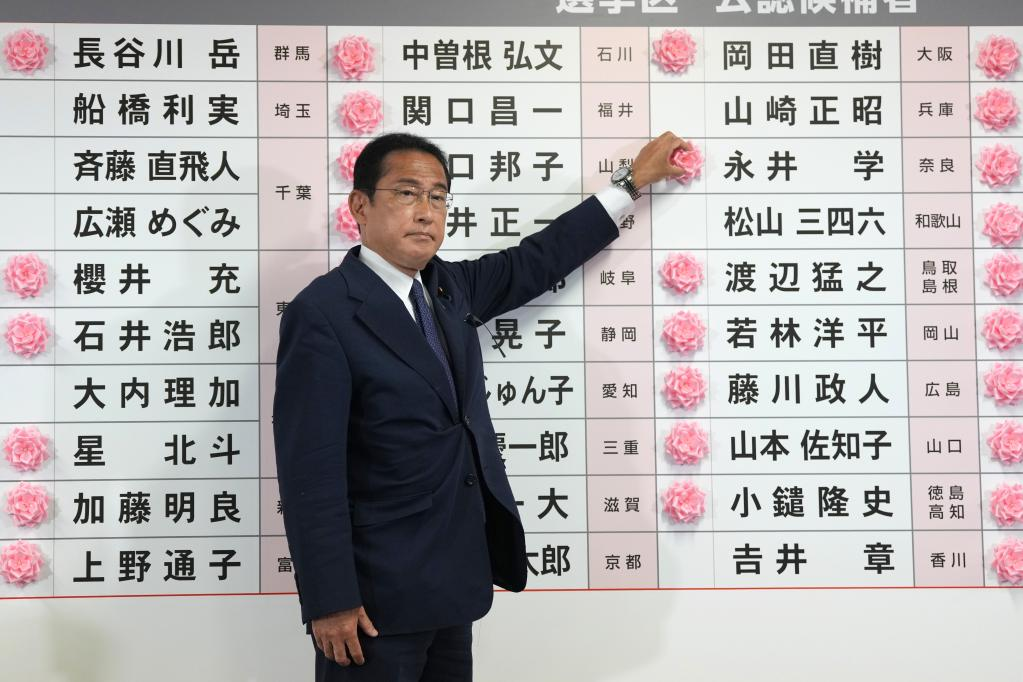By Zhou Wenxing
Although a sweeping victory in Japan's House of Councilors election has been secured by the ruling bloc of the Liberal Democratic Party (LDP) and Komeito on July 11, it seems to be self-evident that the Japanese political circle is gearing up to confront China. A recent case in point is that such major political parties as the ruling LDP, the Constitutional Democratic Party of Japan, and the Japan Innovation Party, have included Taiwan-related issues in their campaign platforms ahead of the election.
As the Taiwan question is China's internal affairs, Japan's meddling with the issue would undoubtedly bring negative consequences to its relations with China, which could in turn damage Tokyo's national interests given its geographic proximity with China and economic interdependence with the world's second largest economy. In this case, people can't help wondering why a growing number of Japanese politicians are devoting themselves to interfere in the Taiwan region.
The first reason lies in the haunting "China threat" in Japanese political and strategic circles. In the past decades, the Japanese government has been pursuing its so-called great power status largely by means of diplomatic offensive and official development investment under the guidance of a pacifist foreign policy. To this end, politicians were dedicated to developing constructive and cooperative relations with China. Although conservative forces were trying to impose their influence on Japanese policy towards China, their efforts did not pay off.
However, the ever-increasing negative views of China among Japanese people are contributing to conservative politicians' consolidation of their ill-considered tough China policy. According to a latest joint public opinion survey conducted in Japan and China in 2021, nearly 91 percent of Japanese respondents hold unfavorable views of China while merely 9 percent sees China favorably. The gloomy perceptions of China by Japanese public has emboldened the country's conservative political circles to exploit the Taiwan question to their own advantage.
Some external factors play a more crucial role in shaping Japanese politicians' anti-China policy trend. One key factor is China's rising political, economic and security influence.
In the eyes of some conservative politicians in Tokyo, a rising China is determined to reunify the Taiwan region by force if necessary. They believe that Beijing's "revisionist strategy" would definitely threaten the security of Japan's sea lane. Arguments such as "a Taiwan contingency is a Japanese contingency" - which was proposed by the former Japanese prime minister Shinzo Abe and shared by more senior officials in the incumbent Fumio Kishida cabinet - basically reflect some politicians' motivations behind their decision to meddle in China's domestic issue.
Another key factor is the substantial change of China-U.S. relations, which rendered the "China threat" perception into a policy option that gradually endorsed Japanese government. There is no doubt that the Biden administration is determined to deter China's further development under its strategic competition framework. The conflict between Russia and Ukraine has become another key variable drawing the Kishida cabinet and the Biden administration much closer in coordinating their policies, in their view, to deter Beijing from using force against the Taiwan island.

Japanese Prime Minister Fumio Kishida, who is also the leader of the ruling Liberal Democratic Party (LDP), places a paper flower next to the name of an LDP candidate who has won a seat in the House of Councilors election at the LDP headquarters in Tokyo, Japan, July 10, 2022. [Photo/Xinhua]
The China-Japan relations would be expected to deteriorate continuously should the Japanese government doubles down its efforts to interfere into the sensitive Taiwan question. Retrospectively, the Japanese government normalized its relations with China in 1972 mainly due to the "Nixon shock," i.e., repercussions caused by then U.S. president Richard Nixon's secret visit to China.
Ironically, the Japanese government now adopts a confrontational China policy at a time when it marks the 50 anniversary of the establishment of diplomatic relations with China. Japan reneged on promises, including respecting the one-China principle it made in the 1972 Sino-Japanese Joint Statement.
Admittedly, those conservative politicians could gain some short-term benefits by being tough on China. But they should bear in mind that they would lose more in the long run.
Firstly, an anti-China policy provides no help in Japan's pursuit of its great power status. On the contrary, Tokyo could benefit from stable and constructive China-Japan relations in that regard.
Besides, the Japanese government might suffer from another "Nixon shock." While the China-U.S. relations are embroiled in the alleged strategic competition, no one could exclude the possibility that Washington might reengage with Beijing and form a new normal in future. The Japanese government might be "abandoned" again and therefore be trapped in another policy dilemma.
Furthermore, Japan's antagonism toward China goes against the will of most people in the country. As the same joint survey indicates, there is a large number of Japanese people, albeit their unfavorable views of China, who still have high expectations for the future of China-Japan relations and have an increased desire for closer cooperation between the two countries.
The Japanese political circles should pluck up the courage and pursue independent diplomacy. Refraining themselves from touching the Taiwan question could be the first genuine step towards Japan's great power status. They should also be well aware that China is a powerful neighboring country that they can choose to get along well with.
As the year 2022 marks the 50th anniversary of the normalization of China-Japan diplomatic ties, the Japanese political circles should seize it as an opportunity to change course on Japan's China policy with an eye on the country's long-term strategic goals.
Zhou Wenxing is assistant professor at School of International Studies, Nanjing University and former Asia Fellow at John F. Kennedy School, Harvard University. He writes extensively on comparative politics and international relations, with an emphasis on the Taiwan issue and China-U.S. relations.

 中文
中文





